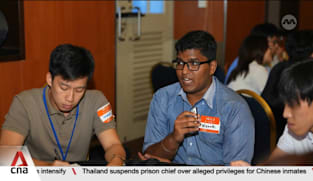Committee of Supply 2024 debate, Day 2: Muhammad Faishal Ibrahim on Corrections 2030 to help ex-offenders and families
Rehabilitation of offenders is a key priority for the Ministry of Home Affairs (MHA) as it embodies the spirit of Forward Singapore to temper unequal outcomes, uplift those in need and prevent them from being trapped in a vicious cycle, said Minister of State for Home Affairs Muhammad Faishal Ibrahim. Outlining MHA’s efforts in this direction in Parliament on Thursday (Feb 29), he said the Singapore Prison Service (SPS) will embark on another major transformation initiative this year under Corrections 2030. It is anchored on three strategies. Firstly, SPS will strengthen the families of inmates to reduce inter-generational offending. SPS uses restorative practices to help inmates understand the impact of their actions and how they can make amends. SPS will expand such practices to help inmates reflect on their role in their family and build their relationship with friends. SPS has also started referring families to self-help groups. Inmates and their families who require support would also be referred to Strengthening Families Programme@Family Service Centre. Secondly, Yellow Ribbon Singapore will maximise the employability and career opportunities of ex-offenders and offer more support in securing jobs in emerging and fast-growing sectors. Thirdly, SPS will mobilise community partners to better support rehabilitation and re-integration. SPS has been providing basic corrections-related training for volunteers and community partners who work with ex-offenders and their families. It will make such training more effective by equipping volunteers with specific competencies needed for their work, such as grief and trauma management.
Rehabilitation of offenders is a key priority for the Ministry of Home Affairs (MHA) as it embodies the spirit of Forward Singapore to temper unequal outcomes, uplift those in need and prevent them from being trapped in a vicious cycle, said Minister of State for Home Affairs Muhammad Faishal Ibrahim. Outlining MHA’s efforts in this direction in Parliament on Thursday (Feb 29), he said the Singapore Prison Service (SPS) will embark on another major transformation initiative this year under Corrections 2030. It is anchored on three strategies. Firstly, SPS will strengthen the families of inmates to reduce inter-generational offending. SPS uses restorative practices to help inmates understand the impact of their actions and how they can make amends. SPS will expand such practices to help inmates reflect on their role in their family and build their relationship with friends. SPS has also started referring families to self-help groups. Inmates and their families who require support would also be referred to Strengthening Families Programme@Family Service Centre. Secondly, Yellow Ribbon Singapore will maximise the employability and career opportunities of ex-offenders and offer more support in securing jobs in emerging and fast-growing sectors. Thirdly, SPS will mobilise community partners to better support rehabilitation and re-integration. SPS has been providing basic corrections-related training for volunteers and community partners who work with ex-offenders and their families. It will make such training more effective by equipping volunteers with specific competencies needed for their work, such as grief and trauma management.



















